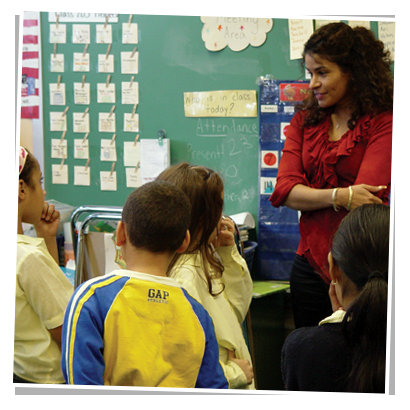




Helping seniors live with independence and dignity.
Social workers who specialize in aging help seniors and their families face the challenges of growing older. That could mean providing direct counseling, dealing with special health care needs, or even something as basic as better nutrition – whatever it takes to keep seniors living well and as independently as possible.
As the U.S. population ages, there will be a tremendous need and lots of opportunities for social workers choosing to specialize in helping seniors and their families. Learn more from these real stories of social workers in action.


Keeping families strong and making sure kids grow up healthy.
Do you enjoy working with children? Do you believe strong family relationships are important to an individual’s wellbeing? Then this area of social work may be for you.
Supporting families and ensuring the healthy development of children offers a wide range of career opportunities, including adoption, foster care, child protection, and family counseling. You could be working with teens or providing counseling to kids in an elementary school. Wherever a child or a family needs help – social workers are there. Discover more in these real life stories of social workers in action.


Managing the logistical, social and emotional aspects of health and wellness.
How do social workers help with health and wellbeing? We’re a part of many health care teams, working together with doctors, nurses and health professionals. You might find a social worker in a variety of settings – hospitals or hospice, managed care offices and clinics.
As a social worker in this field, you might help someone with cancer, find services for someone with disabilities, or help families live healthier – making sure that people get the physical and emotional support they need. Learn more from these real stories of social workers in action.


On the front lines of helping people cope with mental illness.
As the largest group of mental health providers in the U.S., social workers help people struggling with mental illness, addictions and emotional stress. These issues affect millions of Americans–and social workers are specially trained to help, providing therapy and direct services.
Social workers look at the whole person to determine the services needed. For example, a social worker might counsel a child suffering from depression and work with his teachers. Or she might help a person struggling with substance abuse and provide family therapy. Find out more from these real stories.


Helping people deal with life’s challenges.
As therapists, social workers provide one-on-one or group therapy to a wide variety of people in need – veterans, teenagers, soccer moms and seniors; anyone who needs our help. From depression to addiction, eating disorders to the stress of unemployment, we help people deal with a myriad of issues.
Social workers are trained to treat the person within their relationships – as a parent, spouse, employee and the friend – to help them better get back to living. Learn more from these real stories.


Expanding our base of knowledge about social services and the profession.
“Research is one of the most absorbing areas of our profession,” says one social worker about his choice of careers. “It’s a satisfying way to turn your intellectual curiosity into results.”
Researchers study virtually every facet of social work – from how well a program is working, to broader issues such as poverty or homelessness. They organize studies, analyze data, write articles and even testify at public hearings. Some choose to become educators, passing along their knowledge to further the profession and base of knowledge. Learn more from our real stories.


Helping to shape our laws and government programs.
This area of social work looks into larger social issues – such as homelessness, child abuse or racism – and works to improve our laws, policies and government programs. Social workers in this field might conduct research, study needs and propose legislation. They could build a coalition of groups, help create policy, lobby government officials or raise funds.
As one social worker said, “This is where I feel I can make the greatest difference for the most people.” Read these real stories for examples.


Putting the power of organizations to work for people.
Would you like to help a non-government organization respond to disasters or provide aid? Join a charitable organization to direct services and funds? Or work with employees in the private sector? Social work offers a chance to make a real difference in people’s lives on a daily basis, in offices and agencies across the country.
Human resources, employee assistance programs, non-profit agencies, philanthropic organizations: there are thousands of organizations in the United States that employ a social worker’s special expertise. Read our real life stories for more.


Providing vital services to those who serve America.
There are nearly 24 million veterans in the United States, and thousands of social workers provide support to help them and their families. As specialists in this area, we can assist with everything from housing and reintegration into the community, to coping with disabilities.
Social workers are also specially trained to help with the unique problems veterans face, such as post-traumatic stress disorder. Learn more from the stories below.


Empowering community members to improve their quality of life.
Community organizers help residents and families of different communities structure their resources to effect positive social change. We work with and develop new local leaders, galvanize grassroots support and develop reform campaigns. We deal with issues ranging from poverty and civil rights to environmental health.
As a result of our efforts, institutions and officials often deliver more effective strategies and services for people of all ages. Find out more from these real social work stories.